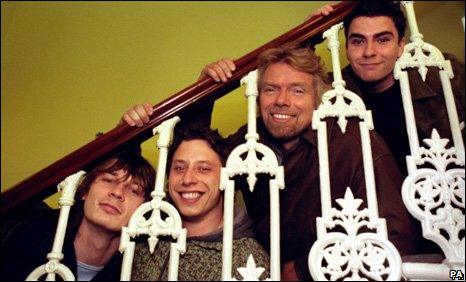Drummer Cable found fame but stayed close to roots
- Published

Stuart Cable (second left) with other members of Stereophonics, after signing with Richard Branson
Stuart Cable, who has been found dead at his home in the south Wales village of Llwydcoed, was a local boy who hit the heights of rock fame with Stereophonics.
He fell back to earth after being sacked by letter but then re-invented himself as a broadcaster, while starting a new band, and was due to launch a debut album next weekend.
Born on 19 May 1970, he grew up on the same street as Kelly Jones, the good-looking frontman of Stereophonics, the band they formed together.
The pair began playing in bands in their early teens, went through a glam rock phase but became a global name when they followed their love of rock music.
With mounds of curly brown hair and a deep gravelly voice, Cable's looks and voice perfectly suited his rock and roll image and later incarnations as a host for 大象传媒 Wales TV and radio and briefly for commercial radio.
His last 大象传媒 Radio Wales show went out on Saturday evening, 36 hours before he was found dead at his mansion-style home a mile or so outside Cwmaman, where he grew up.
Despite the fame and wealth which his early music brought him, Cable remained close to his family and childhood friends in the south Wales valleys.
Stuart Cable had the big hair and deep voice to suit his heavy rock star image
He called his home Castle Cable and used it as a welcome refuge from his celebrity which he and Jones worked hard to achieve.
He celebrated his 40th birthday only recently.
Cable's early partnership with Jones began with them playing popular rock and soul standards at the local working men's clubs.
In their glamrock phase they had a band called Zephyr but as they gravitated to an indie rock sound, they changed to Tragic Love Company.
Jones is often hailed as the band's creative force but it was Cable to who coined the name Stereophonics, inspired, it is said, by the markings on his antique radio set.
With the name sorted, the Stereophonics - including bassist Richard Jones (no relation) - were signed by Richard Branson in 1996.
Cable, with his big hair and equally larger than life personality, was a cornerstone of their look as well as their sound.
His boisterous playing - he was a hard rock fan - had a charm and style of its own.
The Stereos recorded four albums with Cable. Their second, Performance and Cocktails, reached the top of the UK charts and world tours followed.
But there were said to be tensions in the band about his burgeoning career as a presenter, and Cable was reputedly sacked by letter as they promoted their fourth album.
Cable's career as a presenter - he hosted his own television show, Cable TV, and radio show, Cable Rock, for 大象传媒 Wales - continued. He had only returned to 大象传媒 Radio Wales in April for a new series.
But he was determined to make it big again with his new band Killing for Company.
大象传媒 Radio Wales producer Alistair McGhee, who worked with Cable for many years, said: "I was at Stuart's birthday party just a few short weeks ago and I saw him on Saturday night when he was presenting his show on Radio Wales. It's quite stunning really.
"Somebody who was alive and full of energy just a few short hours ago has gone and left a considerable hole in Welsh life."
He added: "He just seemed to enjoy every bit of life as much as he could."
Mr McGhee paid tribute to Cable's work as a music show presenter on Radio Wales.
He said: "Stuart was a natural and he took to the business of presenting with that same enthusiasm, with that same drive and with that same kind of wisdom in knowing it was about the programme and not about egos."
As well as music, Cable lent his support to health campaigns, including organ donation and a 大象传媒 Wales-sponsored drive to urge young men to look out for the warning signs of testicular cancer.
'Grounded'
His death comes only days before Killing For Company were due to play at this year's Download festival at Donnington, and release their debut album.
The band opened for The Who, when they played Swansea's new Liberty stadium. Cable cited The Who's Baba O'Riley as his favourite drum solo.
Journalist Jeff Collins has written a book about Cable's career after Stereophonics.
Collins, said: "He enjoyed chatting about music.
Tributes were being emailed by fans and musicians alike to 大象传媒 Wales
"Clearly, he was a star and was used to having his own way but he could be nice.
"Stuart couldn't leave Wales. Insead of going to London he bought a massive house in Aberdare.
"He loved the fact that he would still go out to the local pubs with all his mates in Cwmaman.
"He kept saying he wanted to be grounded. He wanted to stay in Wales.
"On the one hand, he loved the fact that he was well known in Wales but he also shunned all the London spotlight."